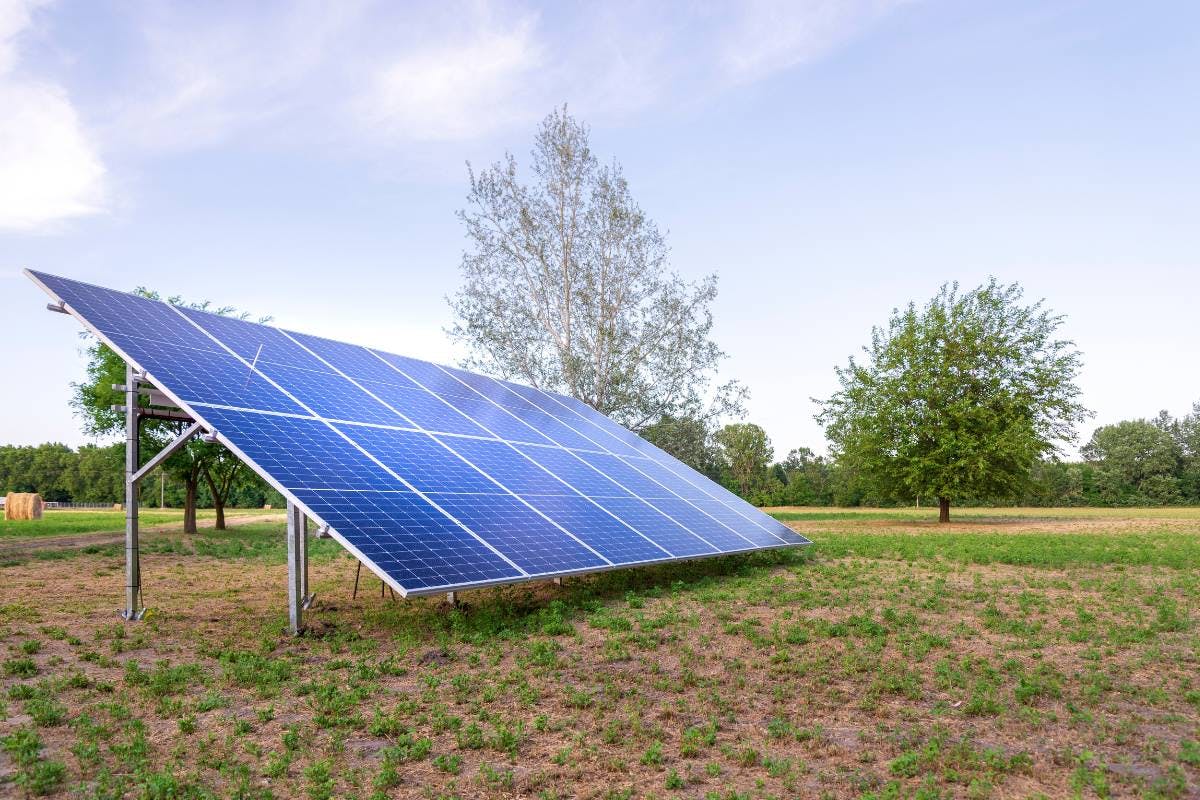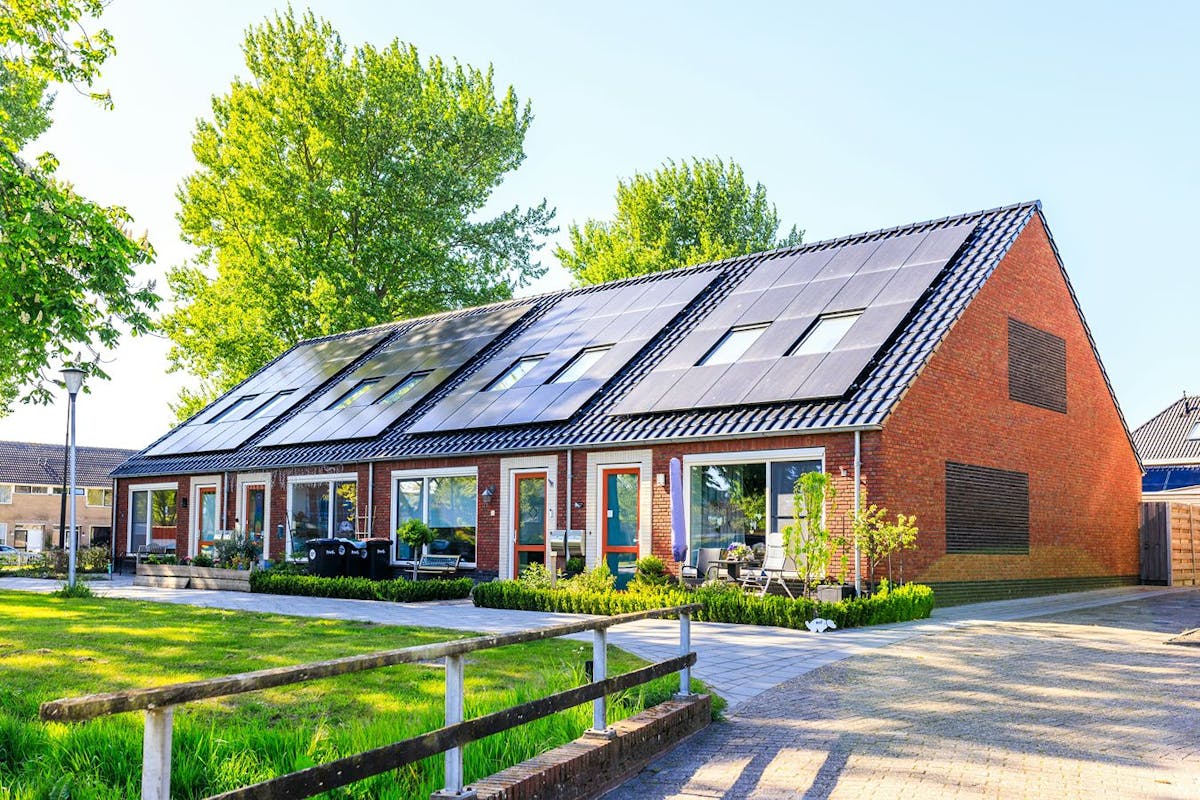Ground-Mounted Solar Panels: Do They Make Sense for Homes?
Last edited

Author
Andrew Giermak
Solar and Electrification Writer and Editor

Editor
Andrew Blok
Electrification and Solar Writer and Editor

If you've seen ground-mounted solar panels, it may have been in large arrays of hundreds of solar panels. These utility-scale solar installations generate tons of electricity around the country where wide open spaces provide plenty of access to sunlight.
If you've got open space, you might be wondering if you could mount home solar panels on the ground. Especially if you don't have adequate sunny roof space, ground-mounted panels could be a solution. Here's what you need to know.
See how much you can save by going solar with Palmetto
What’s a Ground-Mounted Solar Panel System?
Ground-mounted solar panels, just like rooftop panels, generate electricity from sunlight. The only difference is the panels are installed near ground level, either on a metal frame or attached to poles.
There are more rooftop solar panels than ground-mounted panels at US homes. However, there are times that a ground-mounted system will work best for you.
There are two main ways to install ground-mounted solar panels.
- Standard ground-mounted solar panels: A metal frame or racking system is attached to the ground and holds your panels at a specific angle.
- Pole-mounted solar panels: Solar panels are attached to a metal frame on a pole, elevating the panels higher off the ground. Pole-mounted solar can have a tracking system (either single-axis or dual-axis) that rotates throughout the day to have the optimal angle for exposure to sunlight. (Trackers typically aren’t suitable for homes.)
Ground-mounted solar panels typically require more empty space around them than rooftop panels to avoid shading. This is why you usually see them on farms, ranches, and other properties with a lot of flat, open land but rarely see them in urban and suburban residential areas.
Because they aren’t mounted to a building, ground-mounted solar panels can be specifically aligned to capture the most sunlight and generate the most electricity. That’s why you’re more likely to see these panels installed as utility-scale solar power systems in areas with higher peak sun hours.
Requirements for a Ground-Mounted Solar Power System
When researching whether or not you can install a ground-mounted solar power system on your property, there are three primary factors to consider.
Physical space
Ground-mounted solar power systems need sufficient space and trenching for wiring. Most experts recommend at least 50 feet of open space between the solar panels and any adjacent structures.
Your city or town may have setback requirements that control how close you can build to the edge of your property line.
Soil type
A solar power system needs a strong foundation to avoid settling and alignment issues, remain secure during inclement weather, and maintain distance from groundwater.
Expert soil testing can ensure your land is a good fit for ground-mounted solar panels.
Financing options
Ground-mounted solar panels can have a higher upfront cost than rooftop solar panels, making them a less cost-effective option. Many homeowners finance the investment with a solar loan through their bank or other lenders, but some of those options may be specific to roof-mounted solar. To get detailed information about your options for solar financing, you should talk to an experienced solar company in your area or your preferred banking institution.
See how much you can save by going solar with Palmetto
The Pros of Ground-Mount Solar Panels
For some homeowners, ground-mounted solar panels generate more power and can be easier to install and site. Some homeowners might prefer keeping panels off their roof.
Easier placement
For most residential systems, the space on a roof is plenty for an efficient and dependable solar system.
If that’s not the case, a ground-mounted array could be the answer. You may have more ability to customize the system size (now and in the future) and total power output.
More solar production
Ground-mounted solar panels can be more productive per panel than rooftop solar arrays because you aren’t limited by roof size or angle. Instead, they can be placed at the ideal angle to optimize energy production.
You can tilt a rooftop solar power system, but not to the same degree as a ground-mounted system.
Simpler maintenance
Because your solar panels are on the ground, cleaning and maintenance are easier. You can usually reach and clean the solar panels yourself with a gentle rinse from a garden hose.
No panels on your roof
Rooftop solar systems are installed all over the country on many types of roofs without causing leaks. However, some homeowners might not want any construction done on their roof. For others, it could simply be an aesthetic choice.
The Cons of Ground-Mounted Solar
Ground-mounted solar panels might mean higher costs and additional safety concerns.
Higher installation costs
Ground-mounted solar panels typically cost more because they require additional structure, materials, and time for installation. This is especially true for a pole-mounted system.
For example, the system requires a sturdy foundation. This means you could need site upgrades before installation.
Increased safety risk
Ground-mounted solar panels may put expensive electrical equipment in reach of kids, pets, and other animals. Even with proper fencing and other precautions, the potential for damage to your solar panels and danger to yourself and others may be higher.
Shading concerns
An advantage of rooftop solar panels is that the panels are above many objects that could block sunlight. It could be harder to find a shade-free area on the ground.
Extra permitting
Ground solar power systems may require additional solar permitting in certain areas. These zoning, environmental, and planning authorities may want to review your system before and after installation, which can add time and cost to your overall system.
Are Ground-Mounted Solar Panels Right for You?
The vast majority of homes will be best served by a rooftop system. For homes with unsuitable roofs, a ground-mounted system may be a fit.
In those cases, ground-mounted solar panels can provide efficient, affordable, and independent energy for decades. Solar power systems, ground-mounted or rooftop, typically last 25 or more years.
If you want to learn more about installing a solar power system on your home, check out Palmetto’s solar design and savings estimate tool to find out how much you could save on your electricity bills by going solar.
See what solar can do for you:
Frequently Asked Questions
Can solar panels only go on your roof?
Solar panel systems can also be ground-mounted. In most cases, rooftop panels are the best answer when combining the upfront expense and your projected savings over the lifespan of a new solar system. On some properties, rooftop panels may not be viable, making ground-mounted panels the best option.
Are ground-mounted solar panels worth it?
Ground-mounted solar panels can be the better choice if your roof isn’t suitable. They could still save you money in the long run.
Are ground-mounted panels more expensive than rooftop solar panels?
For most homeowners going solar, a ground-mounted solar system is more expensive to install than a rooftop system.
Disclaimer: This content is for educational purposes only. Palmetto does not provide tax, legal, or accounting advice. Please consult your own tax, legal, and accounting advisors.


